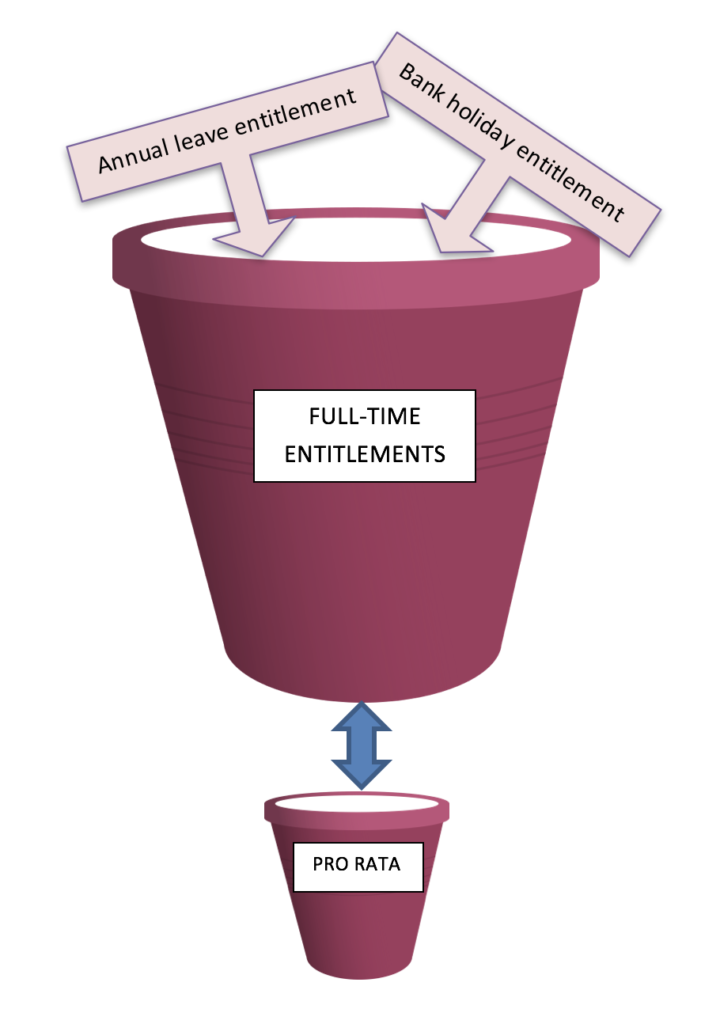 (Time to read: 10 minutes)
(Time to read: 10 minutes)
Back in the day, a bank holiday was a nationally recognised day off. Banks wouldn’t open, everyone chilled out and the country stopped for a breather. Wow, wouldn’t that be nice today!
But in reality, not all employers paid their staff for bank holiday time off and some staff didn’t get the day off at all. In law, there has never been an entitlement for staff to have paid bank holidays.
To an extent, this changed in April 2009. Since that date the official basis for all annual leave is as follows: “A worker has a statutory right to take a minimum of 5.6 weeks for a full-time worker (28 days). Bank and public holidays may be included in the 28 days.”
Most employers now work on the basis that of those 28 days, 8 are the “bank holidays” and the remaining 20 are the “annual leave” days. If your company offers a higher amount of annual leave, say 5 weeks, then the overall figure would be 33 days (25 days of “annual leave” and 8 “bank holidays”).
Simple, right? Well… what about part-time people? Or people who work more hours on one day than another day? Or those for whom a working day never lands on a bank holiday? Or those who only work Mondays and seem to get loads of extra days off? What about places that don’t close on a bank holiday? Should people come to work? Is it treated like a normal holiday? And how do you calculate how much holiday people earn and how much holiday is used?
The reason this stumps people is simple: The bank holidays aren’t just part of the calculation; they really happen. In real time! And it’s not always easy to know how to apply the 8 days while bearing in mind how the real bank holidays will affect people. This becomes increasingly complicated when you consider part-time employees.
Here’s a simple explanation of how to apply bank holidays:
- Full-time employees are entitled to 28 days’ statutory annual leave (8 of which are usually allocated to bank holidays)
People who work less than full-time have a pro-rata entitlement as follows:
- 28 ÷ a x b = C
- Full time = a
- Their working hours = b
- Their bank holiday entitlement = C
You can follow the same logic if you wish to calculate the bank holiday element separately, e.g. 8 ÷ a x b = C, and you can also substitute your practice’s entitlements, if they are different to the statutory entitlements.
When bank holidays happen on the calendar there are two possible effects:
- Surgery closes for bank holidays: an automatic deduction from their overall holiday entitlement for the number of hours they would have worked that day
OR
- Surgery is open for bank holidays: The employee works as usual, and only has the day off if they book it off. Then a deduction from their overall holiday entitlement for the number of hours they would have worked that day is made as usual for booked holiday
It’s easy to assume that as a part-time employee the amount of bank holiday leave you will receive is equal to the number of bank holidays you’ll encounter through the year, but that’s not the case and this is a common misconception. Here’s a little graphic to explain it to any staff you have who find it hard to understand the “pro rata” of entitlements:

So, if the full-time entitlement is set as the minimum (which is 28 days or 5.6 weeks) then a full-timer will get 28 days’ holiday, and 8 of those days will have been given to them in respect of bank holidays. A part-timer will receive a percentage of those 28 days.
So, now we’re all happy with that, let’s work out how those bank holidays affect people in real time. This only applies if your surgery closes for bank holidays. If your surgery is OPEN on bank holidays, then once you’ve got your head around how entitlements are calculated, you’re good to go and your team will just book holiday when they want it, whether it’s a normal day or a bank holiday.
I’d like to introduce you to Sally, Milly and Holly.

Sally works full-time, 37.5 hours, Monday to Friday, 7.5 hours each day

Milly works part-time, 30 hours, Monday to Thursday

Holly works part-time, 10 hours, Thursdays only
For Sally, it’s nice and easy.

20 days’ Annual Leave + 8 days’ Bank Holiday FTE
Full-time worker entitled to full amount
In real life, in 2018, all 8 bank holidays occur on days she works:
- New Year’s Day is a Monday ✅
- Good Friday is a Friday ✅
- Easter Monday is a Monday ✅
- May Day is a Monday ✅
- Spring Bank Holiday is a Monday ✅
- Summer Bank Holiday is a Monday ✅
- Christmas Day Bank Holiday is a Tuesday ✅
- Boxing Day Bank Holiday is a Wednesday ✅
So, 28 days go in, 8 days get used for bank holidays; 20 days remain for her to book at her leisure. Nice and easy!
For Milly, it’s harder!

20 days’ Annual Leave + 8 days’ Bank Holiday FTE
28 days ÷ 37.5 (FTE hours) x 30 (her hours) = 22.4 days
In real life, in 2018, 7 bank holidays occur on days
she works:
- New Year’s Day is a Monday ✅
- Good Friday is a Friday ❌
- Easter Monday is a Monday ✅
- May Day is a Monday ✅
- Spring Bank Holiday is a Monday ✅
- Summer Bank Holiday is a Monday ✅
- Christmas Day Bank Holiday is a Tuesday ✅
- Boxing Day Bank Holiday is a Wednesday ✅
So, 22.4 days go in, 7 days get used for bank holidays, so only 15.4 days remain for her to book at her leisure. She will probably feel a bit short-changed! But it’s the correct and most fair way to manage entitlements.
Holly is another story…

20 days’ Annual Leave + 8 days’ Bank Holiday FTE
28 days ÷ 37.5 (FTE hours) x 10 (her hours) = 7.47 days
In real life, in 2018, 0 bank holidays occur on days
she works!
- New Year’s Day is a Monday ❌
- Good Friday is a Friday ❌
- Easter Monday is a Monday ❌
- May Day is a Monday ❌
- Spring Bank Holiday is a Monday ❌
- Summer Bank Holiday is a Monday ❌
- Christmas Day Bank Holiday is a Tuesday ❌
- Boxing Day Bank Holiday is a Wednesday ❌
So, 7.47 days go in, 0 days get used for bank holidays, so she gets all of her leave to book at her leisure. She actually gains from choosing a working day that doesn’t often have bank holidays fall on it. This might feel unfair. Why should Holly gain but Milly lose? It’s based on their own work pattern; the entitlements are always the same and proportionate, but the way it applies is individual, based on individual work patterns. Before this change in the law in 2009, Holly would have received no entitlement to bank holidays, simply because they don’t happen on the days she works. That wasn’t fair at all, was it? And remember, although Holly isn’t working on the bank holidays, she’s not being paid for those days either.
Also, how do you give someone a fraction of a “day”? And how can you organise holiday by referring to it as a “day” if one person works 7.5 hours in a “day” and another works 10? Easy, just do it all in hours!
I’ll briefly mention Bill and Bob…..

Bill and Bob both work full-time, but not on the same days. Bill works Monday to Wednesday, 12.5 hours each day. Bob works Wednesday to Friday, 12.5 hours each day. They only cross paths on Wednesdays, and that’s probably a good thing, because Bob’s chosen working days leave him with far more of his holiday to book at will than Bill, even though they are both entitled to exactly the same amount of leave.
20 days’ Annual Leave + 8 days’ Bank Holiday FTE
You can’t just give them 28 “days” because if an FTE week is 37.5 hours then an FTE day is 7.5 hours. So, they would effectively get too much time off in real time.
Let’s do it in hours. In hours, the statutory leave entitlement is 210.
For Bill, in real life, in 2018, 7 bank holidays occur on days he works! 
- New Year’s Day is a Monday ✅
- Good Friday is a Friday ❌
- Easter Monday is a Monday ✅
- May Day is a Monday ✅
- Spring Bank Holiday is a Monday ✅
- Summer Bank Holiday is a Monday ✅
- Christmas Day Bank Holiday is a Tuesday ✅
- Boxing Day Bank Holiday is a Wednesday ✅
For Bob, only 2 bank holidays occur on days he works:
- New Year’s Day is a Monday ❌
- Good Friday is a Friday ✅
- Easter Monday is a Monday ❌
- May Day is a Monday ❌
- Spring Bank Holiday is a Monday ❌
- Summer Bank Holiday is a Monday ❌
- Christmas Day Bank Holiday is a Tuesday ❌
- Boxing Day Bank Holiday is a Wednesday ✅
So, 210 hours go in, but for Bill, 87.5 hours are swallowed up by bank holidays and 122.5 hours can be booked at his leisure. For Bob, only 25 hours are swallowed up by bank holidays, so 185 hours can be booked at his leisure! (I bet Wednesdays are frosty!)
So, in essence, everyone’s entitlements are the same, fair and proportionate. However, if their work pattern is heavily populated by bank holidays, more of their overall leave will be allocated to those days, and less will be available for them to use as they wish. Conversely, if their work pattern is very light on bank holiday days, they will find they have more of their overall leave available to book at will.
If you found any of this taxing, there is very good news! Here at Practice Index we have created a really simple and useful toolkit which calculates ALL of this for you. Click here to access the ‘Bank holiday calculator‘ [PLUS].
Please see the short video below to see how it works:
———-
Topics trending in the forum:
I’ve lost my mojo
Recorded telephone calls and of course my precious GDPR
Abusive and aggressive patient comments
Practice manager hours and patient list size
Video: GDPR for GPs





May 11, 2018 at 1:18 pm
The system I inherited allows staff who don’t normally work a bank holiday to have a pro rata amount of bank holiday hours added to their allowance. This apparently was because those who don’t work a bank holiday and get the day off anyway deemed it unfair that they weren’t benefiting from extra time off a bank holiday provides!!